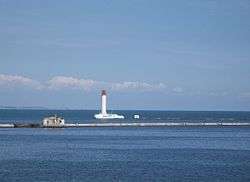Gulf of Odessa
The Gulf of Odessa, or Odessa Bay, (Ukrainian: Одеська затока, Odeska zatoka) is a part of the Black Sea between North Odessa Cape in the north and Cape Velyky Fontan in the south.
| Gulf of Odessa | |
|---|---|
 | |
 | |
| Location | Black Sea |
| Coordinates | 46°28′N 30°46′E |
| Ocean/sea sources | Atlantic Ocean |
| Basin countries | Ukraine |
| Max. width | 20 kilometres (12 mi)[1] |
| Surface area | 38 square kilometres (15 sq mi)[1] |
| Salinity | 10-17 ‰ |
| Settlements | Odessa |
Overview
The coasts of the gulf have capes Langeron and Malyi Fontan. In the north-western part of the gulf the estuaries Kuyalnik and Khadzhibey are separated by the Kuyalnik-Khadzhibey sandbar. The gulf of Odessa is more like a bight, especially considering the fact that geologically it is an extension of Black Sea Lowland. The gulf has a shape of ellipse stretched from southwest to northeast. Its northeastern portion is more shallow having only up to 5 m (16 ft) of depth where its southwestern portion has 14 m (46 ft).[1]
The Gulf of Odessa is under the influence of the flows of the rivers Dnieper, Dniester, and Danube. The salinity of the surface waters is 10–17‰, in the case of upwelling up to 18‰,[2] in some years about 5–7‰.[3]
The City of Odessa and the Port of Odessa are located on the coasts of the gulf.
References
- Facts about the gulf of Odessa. Part one: not suited for submarines, and after thousands of years the Arcadia will become a fjord (Факты об Одесском заливе. Часть первая: не подходит для субмарин, а через тысячу лет Аркадия станет фьордом (инфографика)). Dumskaya. 28 July 2016
- Zaitsev Yu.P. (1992) Ekologicheskoye sostoyaniye shelfovoy zony Chernogo morya u poberezhya Ukrainy (obzor). Hydrobiol. J., 28(4): 3–18. (in Russian)
- Garkavaya G.P., Bogatova Yu.I., Berlinskiy N.A., Goncharov A.Yu. (2000) Rayonirovaniye Ukrainskogo sektora severo-zapadnoy chasti Chernogo morya (po gidrofizicheskim i gidrohimicheskim harakteristikam) [In:] Ekologicheskaya bezopasnost pribrezhnyh i shelfovyh zon i kompleksnoje ispolzovaniye resursov shelfa, Ed.: V.A. Ivanov et al., Sevastopol, Ekosi-Gidrofizika, pp. 9–24. (in Russian)